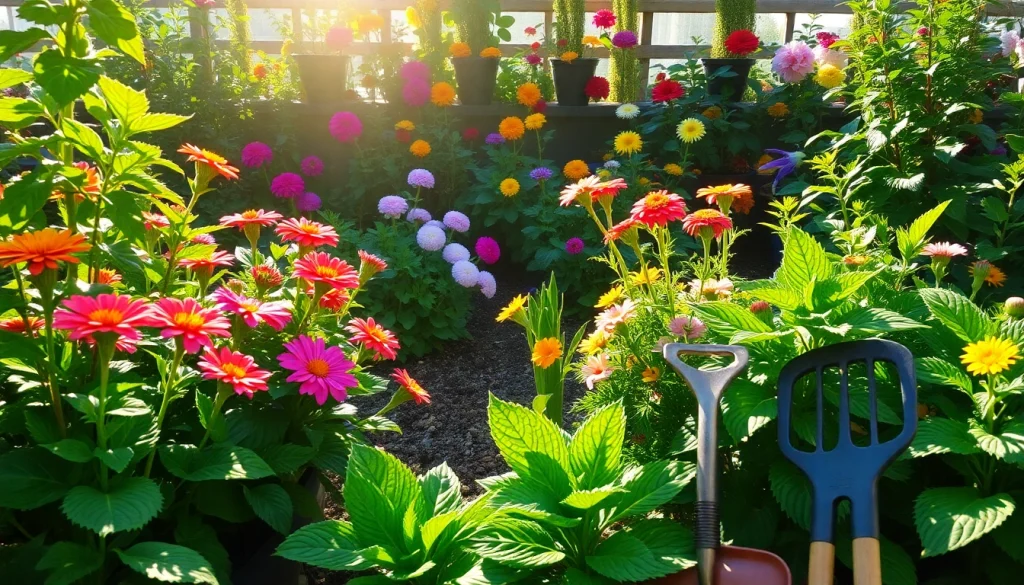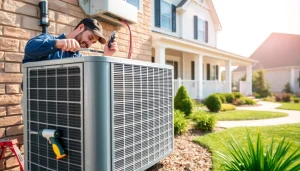Essential Garden Maintenance Services to Keep Your Landscape Thriving

Understanding Garden Maintenance Services
What is Garden Maintenance?
Garden maintenance refers to the comprehensive care and upkeep of gardens, ensuring that they remain healthy, aesthetically pleasing, and functional. This service encompasses a range of activities, including lawn care, pruning, weeding, pest management, and seasonal planting. Whether you are looking to beautify your home garden or maintain a larger landscape, professional garden maintenance service can help streamline the process, allowing for a thriving outdoor space.
Common Challenges in Garden Care
Despite the benefits of gardening, various challenges can hinder a garden’s growth and beauty. Common issues include:
- Pest Infestations: Unwanted pests can damage plants and disrupt the ecosystem.
- Weeds: These can outcompete cultivated plants for nutrients and space.
- Soil Degradation: Poor soil health affects plant growth and vitality.
- Seasonal Changes: Adapting to varying climates and seasons demands an understanding of plant biology and growth cycles.
- Lack of Time: Many homeowners find it challenging to dedicate sufficient time to garden upkeep due to busy schedules.
Benefits of Professional Services
Employing a professional garden maintenance service comes with numerous advantages:
- Expert Knowledge: Professionals bring years of experience and knowledge of plant care, pest management, and landscaping techniques.
- Saves Time: Hiring experts allows homeowners to reclaim their time while ensuring their gardens are well taken care of.
- Access to Tools and Equipment: Professionals use specialized tools that can enhance the maintenance process.
- Consistent Care: Regular scheduled visits ensure that your garden remains in optimal condition throughout the year.
- Increased Property Value: A well-maintained garden can significantly increase the appeal and value of a property.
Key Components of Effective Garden Maintenance
Regular Lawn Care
Regular lawn care is crucial for maintaining a vibrant garden. This includes mowing, edging, aerating, and fertilizing the lawn. Mowing should be done at the right height to encourage healthy growth; most grasses thrive when mowed to a height of 2-3 inches. Aeration helps alleviate soil compaction, allowing water, nutrients, and oxygen to reach the roots more effectively.
Seasonal Planting Strategies
Planning for seasonal changes in planting is essential for creating a flourishing garden. Fall planting can help create a strong root system before winter. Similarly, selecting perennials that bloom in different seasons can ensure ongoing visual appeal. For example, tulips in spring, sunflowers in summer, and chrysanthemums in autumn can create a seamless cycle of blooms throughout the year.
Pest Control Solutions
Pest management is a fundamental aspect of garden maintenance. Utilizing integrated pest management (IPM) strategies can minimize damage while reducing reliance on chemical pesticides. IPM involves:
- Monitoring: Regular observation helps identify pest issues before they escalate.
- Identification: Correctly identifying pests allows for targeted treatment.
- Prevention: Implementing preventive measures such as crop rotation and companion planting can deter pests naturally.
- Control: Utilizing organic pesticides and biological controls can help maintain healthy levels of pest populations.
Hiring the Right Garden Maintenance Service
Qualifications to Look For
Finding the right garden maintenance service can make a significant difference in the quality of care your garden receives. Key qualifications to consider include:
- Experience: Look for services with a proven track record in garden care and maintenance.
- Certifications: Consider companies that employ certified horticulturists or landscape professionals.
- Insurance: Ensure that the service is insured to protect against damages or accidents.
- References: Ask for past client references to gauge satisfaction and service quality.
Questions to Ask Potential Providers
Before hiring a garden maintenance service, consider asking the following questions:
- What services do you offer, and how do you customize them for different gardens?
- How often do you recommend maintenance visits?
- Can you provide references or case studies from previous clients?
- What kind of products do you use for pest and weed management?
- Are your staff members trained and experienced in horticulture?
Comparing Quotes and Services
When comparing garden maintenance services, it’s important to look beyond the price. Factors to consider include the range of services offered, the provider’s reputation, and customer reviews. It can be useful to obtain multiple quotes while asking each provider to break down their services clearly. This transparency can help homeowners make a well-informed decision.
Best Practices for Sustainable Garden Maintenance
Eco-Friendly Practices
Adopting eco-friendly practices in garden maintenance not only supports a healthier environment but can also enhance garden resilience. Examples of sustainable practices include:
- Rainwater Harvesting: Collecting rainwater for irrigation reduces reliance on municipal water sources.
- Organic Mulching: Using organic materials for mulching helps retain soil moisture and suppress weeds while enriching the soil as it decomposes.
- Composting: Recycling garden waste into compost can enrich soil health.
Using Native Plants
Incorporating native plants into your garden design enhances biodiversity and provides habitats for local wildlife. Native plants are adapted to the local climate and soil conditions, often requiring less water and maintenance than non-native species. Furthermore, they thrive in their natural environment and can support local pollinators, such as bees and butterflies.
Soil Health and Fertilization Techniques
Maintaining healthy soil is critical for a successful garden. Conducting soil tests can help identify nutrient deficiencies and pH imbalances, allowing gardeners to amend the soil appropriately. Utilizing organic fertilizers derived from plant or animal sources can provide nutrients without chemical additives. Cover cropping and crop rotation are also effective ways to maintain soil fertility and structure.
Measuring the Success of Your Garden
Tools for Tracking Growth
Measuring the success of your garden requires a combination of quantitative and qualitative data. Tools such as garden journals or mobile apps can help track plant growth, blooming periods, and maintenance schedules. Regularly recording these observations can lead to better decision-making and improved future garden management.
Assessing Seasonal Changes
Assessing how your garden responds to seasonal changes can provide insight into its health and growth patterns. Observing how plants bloom and how they react to weather variations can inform future planting and maintenance strategies. Keeping an eye on color changes, leaf drop, and pest activity can help gardeners anticipate required actions during seasonal transitions.
Customer Feedback and Satisfaction Metrics
Gathering customer feedback is important for continuous improvement in garden maintenance services. Surveys and direct communication can help understand client satisfaction and areas for improvement. Analyzing this feedback regularly ensures the service remains aligned with client expectations and can inform strategies to enhance service delivery.







